In the Writer’s Kitchen: On Collaboration and Community with Front Country’s Melody Walker
By Lily Rex
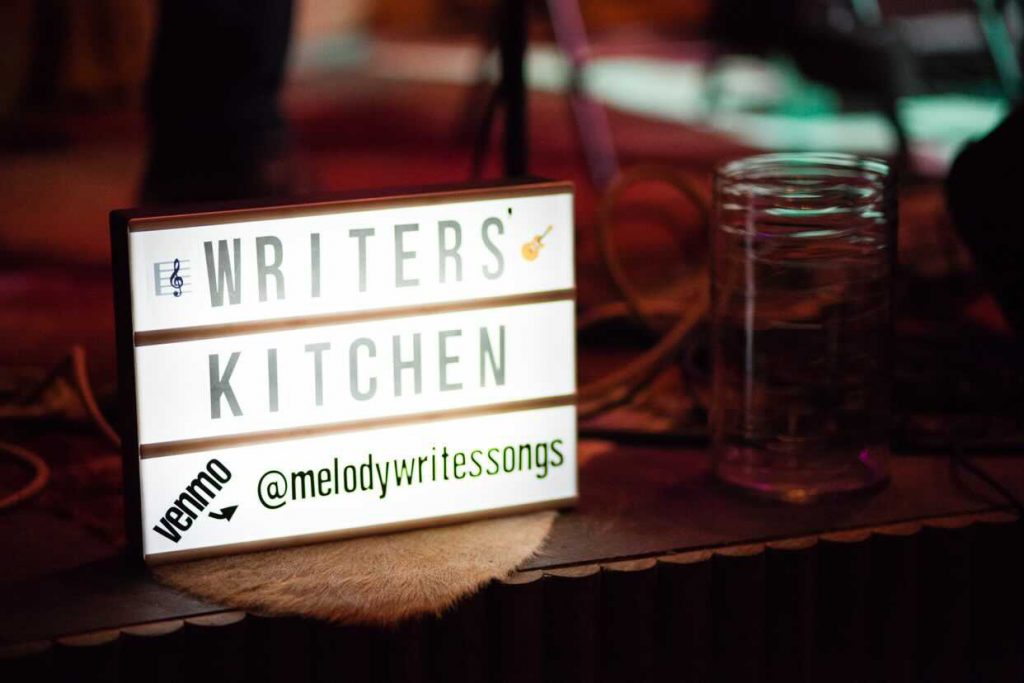
Nashville-based songwriter Melody Walker has earned accolades galore as the voice of the band Front Country and as a fruitful collaborator, most recently working on four of the songs from Molly Tuttle & Golden Highway’s debut album, Crooked Tree. In addition to the anthemic title track, Walker is a co-writer on “Side Saddle,” a vocal collab between Tuttle and the legendary Gillian Welch, “San Francisco Blues,” which features Dan Tyminski from Alison Krauss’s Union Station, and the incendiary murder ballad, “The River Knows.”
It’s been a busy time for Walker, coming out of the pandemic’s isolation and returning to her career with renewed vigor and purpose: she’s got projects with Crys Matthews and Heather Mae coming down the pike next year alongside a duet with pop singer Sarah Potenza and some new solo work as well.
It’d seem that collaborating is where Walker lives, creatively speaking, which makes Writers’ Kitchen—the name of the new writer’s round she’s curating—seem like a completely natural progression. Writers’ Kitchen meets every Tuesday night at Jane’s Hideaway in East Nashville, and it’s quickly becoming the place to see the best of Music City’s own queer and allied bluegrass, folk, and Americana artists.
Walker spoke to us recently about the mechanics of working with Tuttle, building a queer songwriting community in Nashville, and her missed career opportunity as a professional ghost hunter.
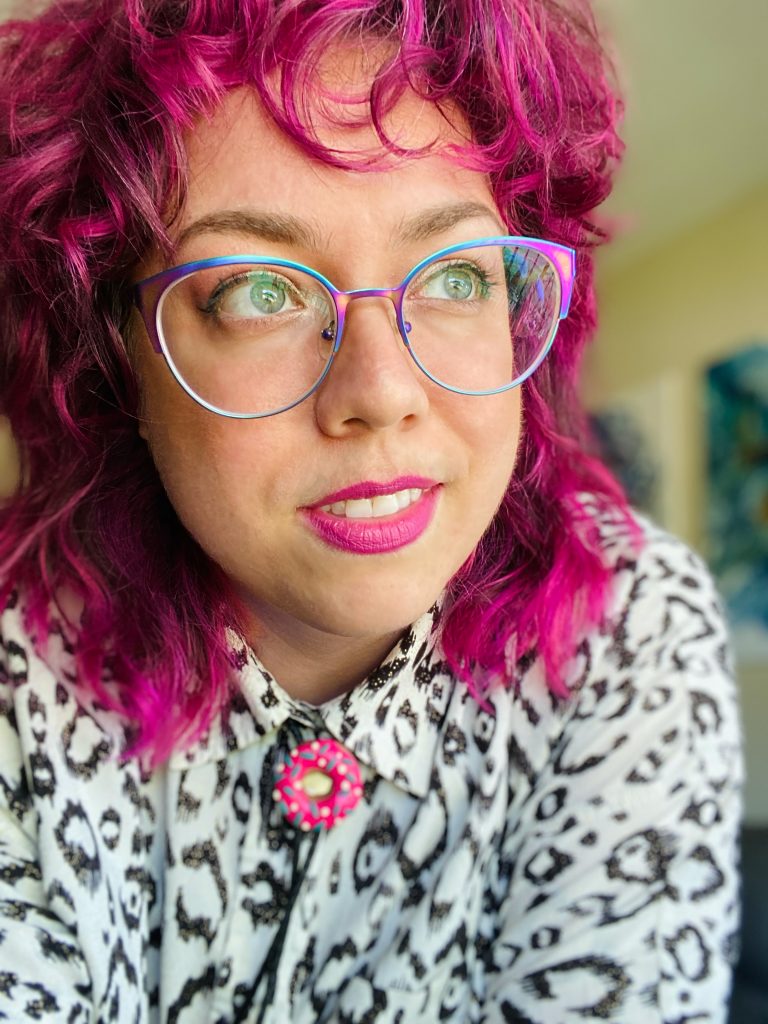
When I first heard “Crooked Tree,” it really resonated with me as a queer person, especially the line “Who am I to wish I wasn’t just the way I am.” It made so much sense to find out there was a queer person behind it. How did “Crooked Tree” come about?
“Crooked Tree” is a super meaningful song for me because I didn’t write for the whole year of 2020, with the pandemic and associated depression and withdrawal from the road. I was very uninspired. I didn’t know what I was doing. My band was basically going on hiatus. Then, in January 2021, Molly asked me to write with her for her bluegrass record. I had not been super excited about the bluegrass scene for a number of years, but I’m super excited for artists like Molly, because I knew that we were gonna do something that was a little different than the standard fare. She was interested in writing feminist songs and songs that have progressive messaging to them. This was actually the first one we wrote.
It came about because we saw a Margo Price Instagram post where she was quoting Tom Waits, who was quoting an old Chinese proverb, essentially. We thought, what if this proverb could be in a story song form? I came up with the initial chorus, and from there we worked together on making the story have an impact. I’m just so happy with how it turned out. I was diagnosed with scoliosis in middle school. So at age 11, I was the unlucky kid who had to wear a back brace. That was obviously a big blow to my self esteem. I was just like that freaky girl, you know? And Molly has Alopecia Areata and lost all her hair when she was a kid, so we both started getting really emotional about the song concept. That’s how you know something’s there. She hypes me up on stage when she announces it sometimes, and it means a lot to me. I’m really proud of that song. I’ll play it forever.
How did “Side Saddle” come about?
“Side Saddle” was a chorus that I had in my head, just that really simple “I don’t wanna ride side saddle, side saddle, side saddle, I just wanna ride bowlegged, bowlegged like the boys.”
I thought, this is clearly a children’s song, and I had tried to write it, but didn’t really know how to approach it. Is it for adults? Is it a children’s song for adults? I played it for Molly on a whim, and she just had a whole vision for it. She said, “Oh no, it’s a western swing song. And it’s gonna be like a cowgirl song.” While we were writing it, I was actually at my folks’ house visiting. My mom was a horse girl and my dad is an enthusiast of cowboy songs too, so I just kept kicking them lines. I said ‘just shout out some terminology!’ I was asking my mom, for instance, ‘would you win a buckle or a ribbon at the rodeo if you won first place?’ Fact checking things about real horse girl shit. My mom always had Appaloosa horses as a kid, so that’s where the Appaloosa came from. It had to be Appaloosa.
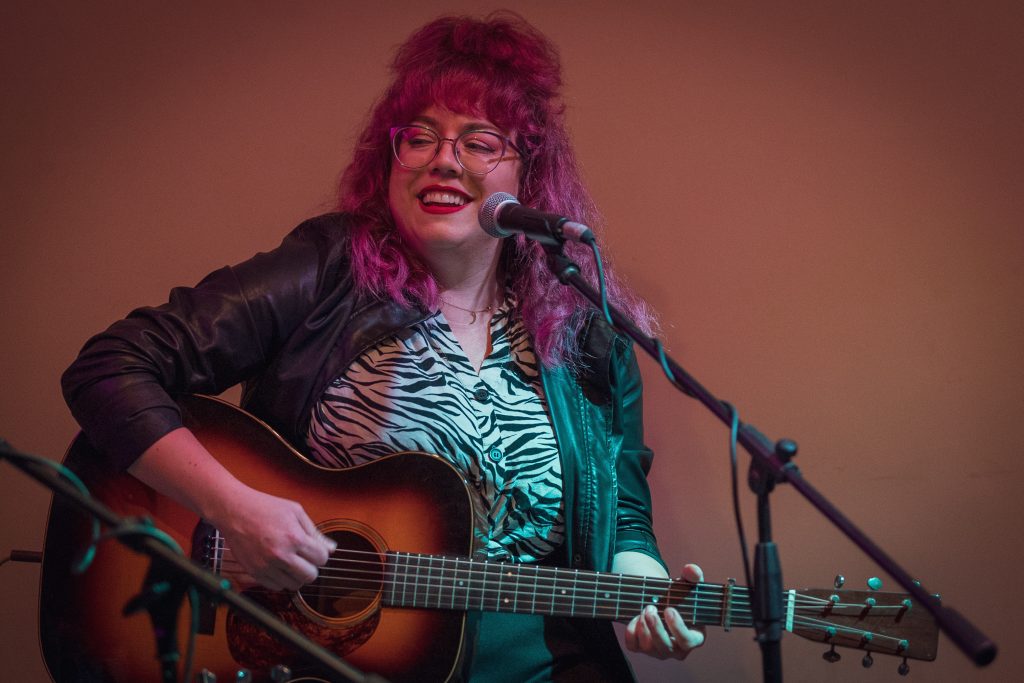
My favorite song on the album is “The River Knows” so you know I have to ask about that one.
We were trying to come up with kind of a murder-ballady, spooky one… a twist on the old time murder ballad. So I was thinking about how it should probably have like a minor-y modal kind of mountain-y feel to it. Molly also needed a clawhammer guitar song for the record, so I thought what if it was the clawhammer guitar one that’s got this spooky minor-modal thing, and we write a feminist murder ballad?! And that is a tall order, especially when Caleb Meyer exists in the world. It’s a tall order, but we basically thought, what if it’s an incel murder ballad? The guy who gets friend-zoned and is pissed about it.
Related to “Crooked Tree” and “The River Knows”—a lot of queer people seem to personify nature. Nature is acted upon very violently, and people try to change it, much like what society does to us. I always say “There’s something about queer people and water.” Do you think it’s a theme we find more readily?
I think nature is queer for sure. Nature is everything. The thing I love to say about queerness in bluegrass or country music is that we’ve always been here. It’s not some new thing. It’s not like queer people are carpetbagging into country. It’s always taken all kinds. That’s what I love about nature. Nature’s very non-judgmental. It doesn’t care. It is what it is. But specifically about Molly’s record, we were definitely trying to write California bluegrass songs because we’re from California, and a big part of California folk and bluegrass are those natural themes. We had to sing about redwood trees and the Sierras. It was very important to us growing up listening to Laurie Lewis and Kate Wolf.
Can you tell me more about your journey to music and your influences?
That’s a long story for sure. My dad is a songwriter. He’s also a working class dude, and he gigs on the weekends. I don’t think that I would be a songwriter today if I didn’t see him do that and show me that it was a valid lifestyle and way of approaching the world. I wouldn’t say that I always knew that I was gonna be a songwriter. I saw songwriting as just a thing that anyone can do. It was not like, “Oh my dad is a songwriter, so I should be a songwriter.” I very much wanted to do something different from my parents. I wanted to be a parapsychologist until I found out that it wasn’t a real job just because I really liked horror movies and ghosts, and I thought I was gonna be a ghost hunter. You could say that songwriting is like a type of ghost hunting though, you know what I mean?
Absolutely.
I definitely had that awakening of songwriters that I looked up to in that era, like Jewel. Then I quickly came to Ani Difranco and Tori Amos. Ani and Tori are my two sides of the coin, ways that women can be songwriters and exist and express themselves. They’re very dichotomous in some ways but also not, you know? One plays guitar, one plays piano, both complete geniuses and just iconic performers and vocalists as well. They’re polarizing vocalists–not everybody is gonna hear their voices and think, “Wow that’s my favorite thing ever.”
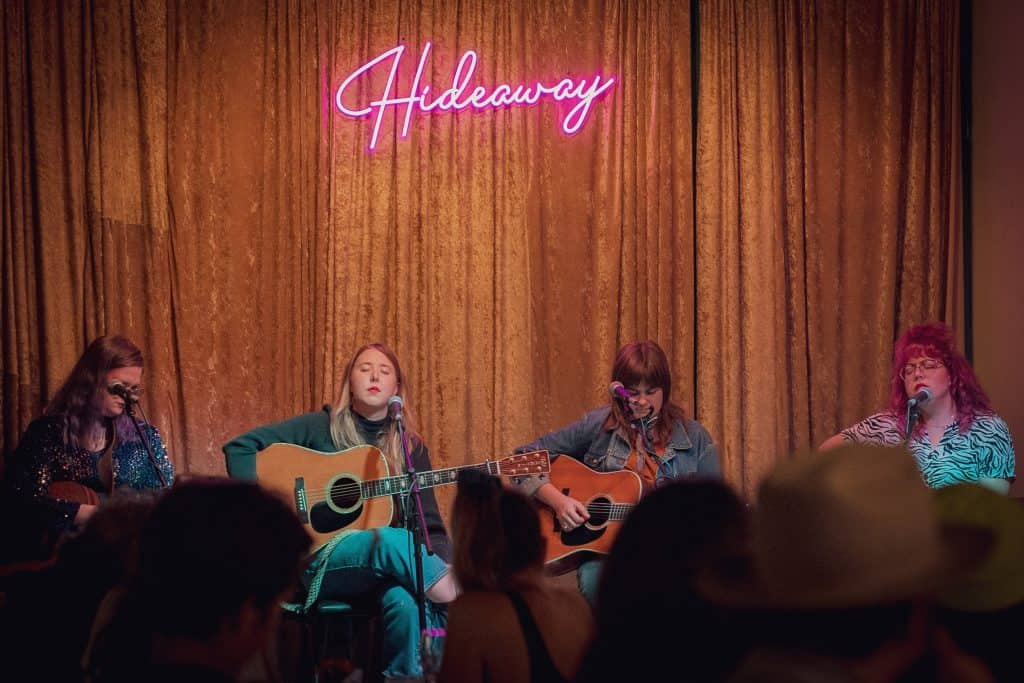
Those women were like my archetypes for how powerful a songwriter could be, so I kind of chased that vein for a while, and I ultimately came back to folk and bluegrass music because that’s what my dad plays, and I grew up around it. I realized that there were cultural roots there for me. I was also really into world music. I studied Brazilian music. I studied in South India. I studied a lot of West African and African Diaspora music. All of that made me realize that I had this rich cultural tradition at home that I was raised around that I could be participating in in a way that was meaningful and would have less of an issue of cultural appropriation.
After I kind of re-embraced bluegrass and folk, I formed the band Front Country. I would say that I am coming to terms more recently with the fact that I really enjoy the songwriting side of things more than I do the pushing-a-music-business-in-capitalism part of things. Songwriters can kind of stay in that creative la-la-land where we’re just doing the pure art thing, and then someone else can go out and do the dirty part of that. Maybe that’s escapist on my part too, but that’s where I’m at right now. I’m really enjoying songwriting, and I’m really appreciative of Molly for being out there on the road with those songs, doing the leg work.
Who are your other collaborators?
Molly has been my main collaborator over the past couple years and also my friend Sarah Potenza. She’s more of a pop artist, and she was on The Voice. She’s my neighbor, and we’re both bi women married to dudes, and we love to do karaoke at Lipstick [Lounge] together. We’re just songwriting besties. We cat-sit each other’s cats.
I mostly co-write with friends. I’m not really in the Nashville machine of songwriting and co-writing. I just write with my friends in East Nashville. I’m completely self-published, and I feel like maybe this is the right way to do it. As of right now, I’m just keeping it about community. And that’s what the writer’s night is about too. As soon as I came to grips with that, the opportunity presented itself, and I was like, “Do I want to make myself show up every Tuesday and maybe play songs I haven’t played before? And then bring friends on stage with me? Hell yeah.”
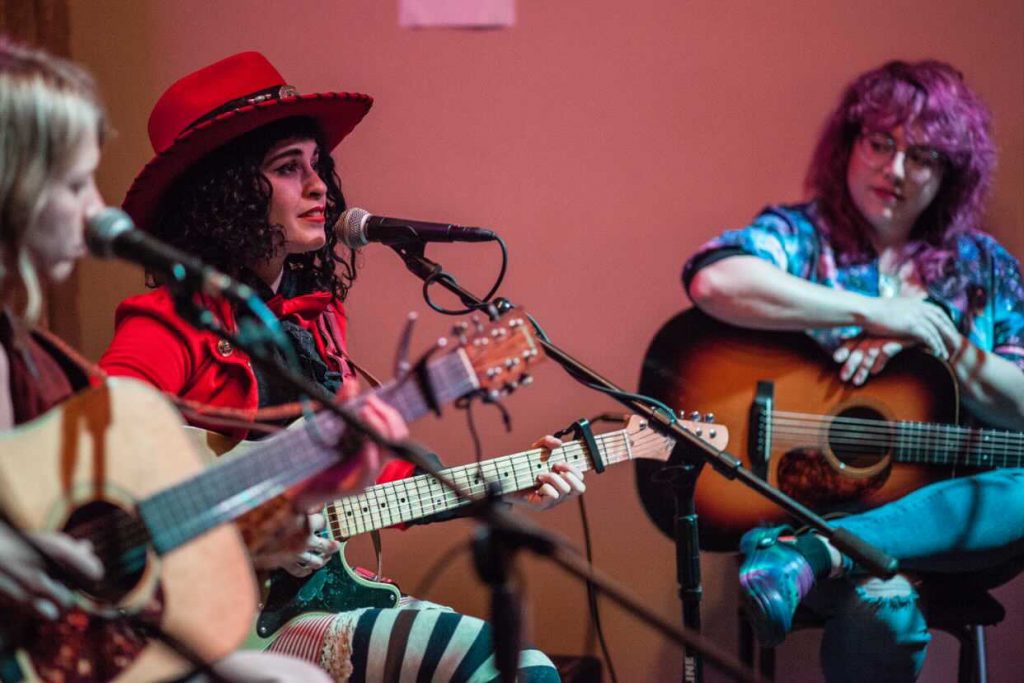
Can you tell me more about being a queer songwriter in Nashville today, and how you’ve seen the landscape change for writers who aren’t straight, white, and cis?
I would say I’m really just starting to fully understand myself as a queer songwriter. I’ve just always wanted to write with no pronouns. If you keep it ‘you’ there’s no gender. I’ve always wanted to keep it open, make sure that everybody can map their experience onto any song that I write. But at the same time, I didn’t want to constrain myself. I’ve always considered myself to be a feminist songwriter for sure, but understanding that tendency to queer things, artistically, was part of my identity as well. I’m still figuring out how to unpack that. I’ve been thinking a lot lately about that nexus of the way that artists want to queer everything and how that applies to queer identity. Are those two different things? Are they indistinguishable? They’re indistinguishable in me, but I don’t know if they’re indistinguishable as concepts. Has that book been written? Maybe I should ask TikTok.
TikTok will know. The Zoomers have it all figured out in ways we don’t.
That’s something else I’ve been doing with my time, weirdly. Getting into TikTok. I’ve been on there as a creator since January, and it’s fairly niche, but I have, like, 35,000 followers, which is more than I can say for any other of my social media channels. I’ve been trying to learn how to talk more about songwriting and my process, share what I’ve learned, and stand in my authority as a songwriter and professional musician. There are a lot of people on there who are new and really wanna hear from someone in the business. So, I’ve weirdly found a lot of community through TikTok and a lot of queer community, specifically. Some of that has even manifested in real life—I’ve gotten work and made new friends through TikTok. I have people playing at Writers’ Kitchen who I met through TikTok. It’s really awesome.
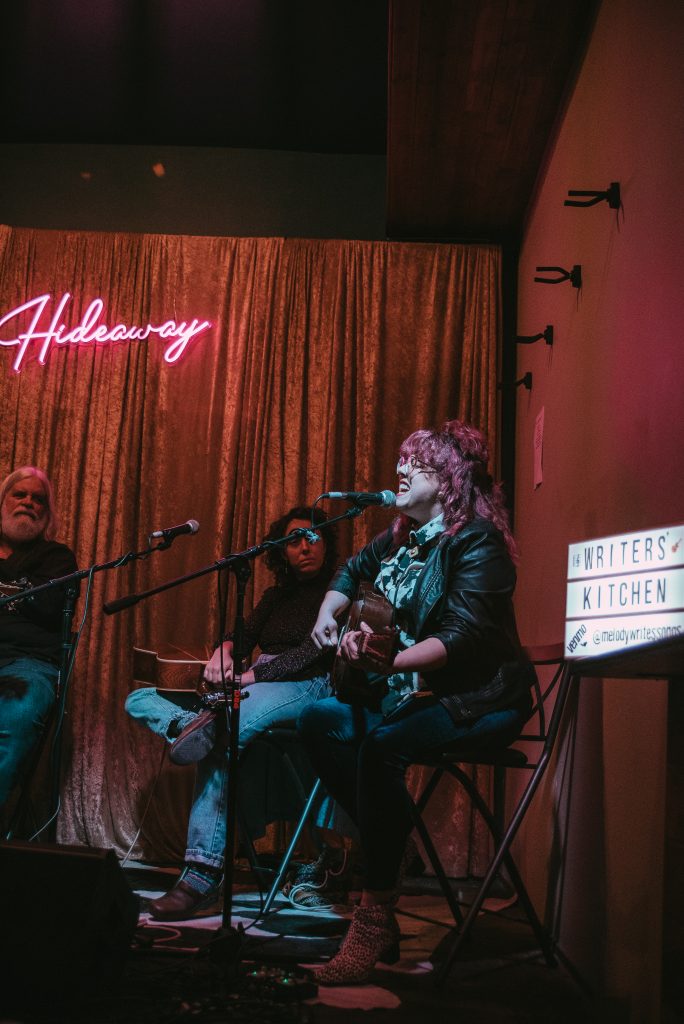
Speaking of Writers’ Kitchen—what are your goals and hopes for it?
I just hope that it’ll be the place that people in East Nashville want to hang out on a Tuesday night… to see their friends and get a drink, maybe have dinner, hear some new songs and get inspired and go home and write. Nothing inspires me more than hearing people play songs. It just sparks something in me. You’ll catch me at a show 100 percent of the time—if I’m into it—with my Notes app pulled up. I hope that it can be like that for people, and that it’ll just be about the hang, too. Like Cheers for songwriters. I had a lot of grief about having my wings clipped and the wheels stopping on the road, but now I’m realizing the benefit of it is being grounded in a place and being able to build community there.
Lily Rex (they/she) is a queer, Nashville-based writer obsessed with American history, rivers, and Country/Folk/Americana music. They hail from Northwest Indiana, where they amassed over 600 bylines in three years as a government watchdog reporter for an independent newspaper, and are the author of the poetry chapbook Rivers Have Friends Too (2021). Follow them on Instagram @rexpoet